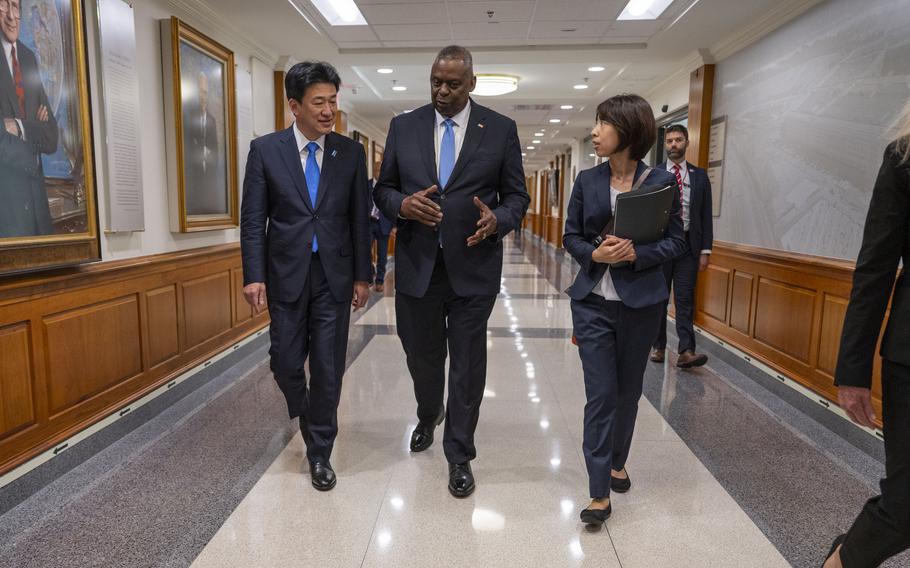
Defense Secretary Lloyd Austin walks with Japan’s Defense Minister Minoru Kihara at the Pentagon in October 2023. (Cesar J. Navarro/Defense Department)
WASHINGTON — Defense Secretary Lloyd Austin returned to work at the Pentagon on Thursday, a few days after being released from Walter Reed National Military Medical Center for non-surgical procedures to correct a bladder problem.
The secretary has been working from home since Tuesday when he was released from the hospital in Bethesda, Md. Austin, 70, was transported Sunday afternoon to the hospital. By 5 p.m., Austin transferred the functions and duties to Deputy Defense Secretary Kathleen Hicks. Air Force Gen. Charles “CQ” Brown, chairman of the Joint Chiefs of Staff, the White House and Congress were notified.
The doctors at Walter Reed said Sunday night that Austin was admitted to a critical care unit after a series of tests and evaluations. They provided an update Monday that Austin underwent non-surgical procedures that required general anesthesia to address his bladder problem.
“His diagnostic evaluation identified the cause of his bladder issue and it was corrected with non-surgical procedures on Feb. 12,” said John Maddox and Gregory Chesnut, doctors at the medical facility. “He progressed well and was discharged to his home today. He is anticipated to continue his full recovery.”
The statement did not specify what was revealed or what kind of procedures were performed.
Austin virtually participated Wednesday in the Ukraine Defense Contact Group meeting. In his opening remarks to about 50 nations, he said the contact group would work on resourcing Ukraine’s most critical near-term needs, “including its urgent need for more artillery, ammunition and air defense missiles.”
The secretary had surgery in December for prostate cancer and was later hospitalized in January for complications from the procedure. However, he failed to provide proper notification to appropriate government officials.
Austin returned to the Pentagon on Jan. 29 after being absent from the building for nearly a month because of his health. He had been released from Walter Reed on Jan. 15 after spending about two weeks there following the surgery, which was conducted Dec. 22.
Austin faced public scrutiny after he failed to notify President Joe Biden and other government officials about his illness and hospitalization. Biden did not learn of Austin’s prostate cancer until Jan. 9. His actions have sparked several reviews of what took place.
The Pentagon announced last week that it completed its internal review of Austin’s hospitalization, which the defense secretary is now reviewing himself. Austin is also scheduled to testify before the House Armed Services Committee on Feb. 29 about his failure to notify the needed officials about his illness.
He has publicly apologized for not disclosing his prostate diagnosis, the surgery that followed and complications that led to an extended hospital stay.
His cancer was discovered during a regular health screening in early December. He was admitted to the hospital about three weeks later for surgery, which required general anesthesia.